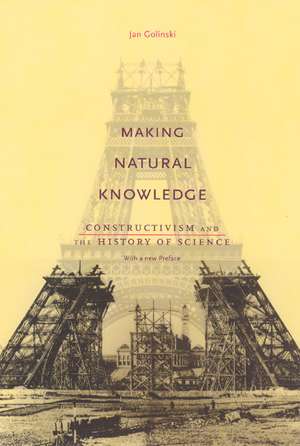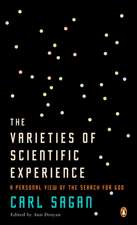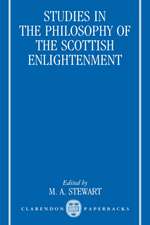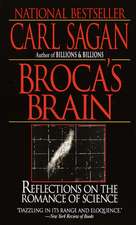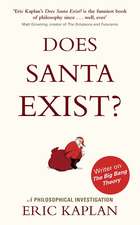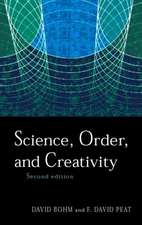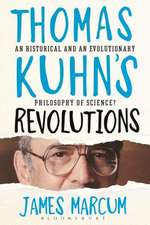Making Natural Knowledge: Constructivism and the History of Science, with a new Preface
Autor Jan Golinskien Limba Engleză Paperback – aug 2005
Arguably the best available introduction to constructivism, a research paradigm that has dominated the history of science for the past forty years, Making Natural Knowledge reflects on the importance of this theory, tells the history of its rise to prominence, and traces its most important tensions.
Viewing scientific knowledge as a product of human culture, Jan Golinski challenges the traditional trajectory of the history of science as steady and autonomous progress. In exploring topics such as the social identity of the scientist, the significance of places where science is practiced, and the roles played by language, instruments, and images, Making Natural Knowledge sheds new light on the relations between science and other cultural domains.
"A standard introduction to historically minded scholars interested in the constructivist programme. In fact, it has been called the 'constructivist's bible' in many a conference corridor."—Matthew Eddy, British Journal for the History of Science
Viewing scientific knowledge as a product of human culture, Jan Golinski challenges the traditional trajectory of the history of science as steady and autonomous progress. In exploring topics such as the social identity of the scientist, the significance of places where science is practiced, and the roles played by language, instruments, and images, Making Natural Knowledge sheds new light on the relations between science and other cultural domains.
"A standard introduction to historically minded scholars interested in the constructivist programme. In fact, it has been called the 'constructivist's bible' in many a conference corridor."—Matthew Eddy, British Journal for the History of Science
Preț: 329.25 lei
Nou
Puncte Express: 494
Preț estimativ în valută:
63.01€ • 65.38$ • 52.66£
63.01€ • 65.38$ • 52.66£
Carte tipărită la comandă
Livrare economică 17-31 martie
Preluare comenzi: 021 569.72.76
Specificații
ISBN-13: 9780226302317
ISBN-10: 0226302318
Pagini: 368
Ilustrații: 10 halftones
Dimensiuni: 152 x 229 x 20 mm
Greutate: 0.37 kg
Ediția:Revised.
Editura: University of Chicago Press
Colecția University of Chicago Press
ISBN-10: 0226302318
Pagini: 368
Ilustrații: 10 halftones
Dimensiuni: 152 x 229 x 20 mm
Greutate: 0.37 kg
Ediția:Revised.
Editura: University of Chicago Press
Colecția University of Chicago Press
Notă biografică
Jan Golinski is professor of history and humanities at the University of New Hampshire. He is coeditor of The Sciences in Enlightened Europe, also published by the University of Chicago Press.
Cuprins
List of Illustrations
New Preface (2005)
Preface
Introduction: Challenges to the Classical View of Science
1. An Outline of Constructivism
From Kuhn to the Sociology of Scientific Knowledge
What's Social about Constructivism?
2. Identity and Discipline
The Making of a Social Identity
The Disciplinary Mold
3. The Place of Production
The Workshop of Nature
Beyond the Laboratory Walls
4. Speaking for Nature
The Open Hand
Stepping into the Circle
5. Interventions and Representations
Instruments and Objects
The Work of Representation
6. Culture and Construction
The Meanings of Culture
Regimes of Construction
Coda: The Obligations of Narrative
Bibliography
Index
New Preface (2005)
Preface
Introduction: Challenges to the Classical View of Science
1. An Outline of Constructivism
From Kuhn to the Sociology of Scientific Knowledge
What's Social about Constructivism?
2. Identity and Discipline
The Making of a Social Identity
The Disciplinary Mold
3. The Place of Production
The Workshop of Nature
Beyond the Laboratory Walls
4. Speaking for Nature
The Open Hand
Stepping into the Circle
5. Interventions and Representations
Instruments and Objects
The Work of Representation
6. Culture and Construction
The Meanings of Culture
Regimes of Construction
Coda: The Obligations of Narrative
Bibliography
Index
Recenzii
“[In the] years since its first edition was published, [Making Natural Knowledge] has become a standard introduction to historically minded scholars interested in the constructivist programme. In fact, it has been called the ‘constructivist's bible’ in many a conference corridor.”
“Golinski writes for an audience of graduate students and senior undergraduates. . . . On the whole, [he] succeeds admirably. His book is well organized and fluently written. Basic ideas are clearly explained, and his style is blessedly free of the jargon and posturing that makes a great deal of science studies literature a penance to read. . . . ‘Constructivism’ for Golinski is not a set of formal principles but an approach or point of view, one that sees science as a form of cultural practice constructed in particular local contexts out of available cultural and material resources. . . . Historians who only want to use the constructivists’ tool kit will appreciate his eclecticism. I arrange my undergraduate courses in sciences studies in much the same way. . . . I will use this book as a text the next time around.”
“Golinski puts on display the multifaceted scholarship that has comprised science studies over the past three decades. Unlike some of the scholarship in this area that is laden with unnecessary jargon . . . Golinski employs straightforward, readable prose appropriate to his intended audiences of advanced undergraduates and graduate students (I have recommended it to several).”
“Golinski has provided an important map of the different historigraphical perspectives adopted by historians of science in recent years.”
“Golinski writes for an audience of graduate students and senior undergraduates. . . . On the whole, [he] succeeds admirably. His book is well organized and fluently written. Basic ideas are clearly explained, and his style is blessedly free of the jargon and posturing that makes a great deal of science studies literature a penance to read. . . . ‘Constructivism’ for Golinski is not a set of formal principles but an approach or point of view, one that sees science as a form of cultural practice constructed in particular local contexts out of available cultural and material resources. . . . Historians who only want to use the constructivists’ tool kit will appreciate his eclecticism. I arrange my undergraduate courses in sciences studies in much the same way. . . . I will use this book as a text the next time around.”
